Tsai Ing-wen
| Tsai Ing-wen | |
|---|---|
| 蔡英文 | |
 | |
| President of the Republic of China | |
|
Assumed office 20 May 2016 | |
| Premier |
Lin Chuan William Lai |
| Vice President | Chen Chien-jen |
| Preceded by | Ma Ying-jeou |
| Chairwoman of the Democratic Progressive Party | |
|
Assumed office 28 May 2014 | |
| Preceded by | Su Tseng-chang |
|
In office 27 April 2011 – 14 January 2012 | |
| Preceded by | Ker Chien-ming (Acting) |
| Succeeded by | Chen Chu (Acting) |
|
In office 20 May 2008 – 17 March 2011 | |
| Preceded by | Frank Hsieh (Acting) |
| Succeeded by | Ker Chien-ming (Acting) |
| Vice Premier of the Republic of China | |
|
In office 25 January 2006 – 21 May 2007 | |
| Premier | Su Tseng-chang |
| Preceded by | Wu Rong-i |
| Succeeded by | Chiou I-jen |
| Member of the Legislative Yuan | |
|
In office 1 February 2005 – 24 January 2006 | |
| Succeeded by | Wu Ming-ming |
| Minister of the Mainland Affairs Council | |
|
In office 20 May 2000 – 20 May 2004 | |
| Premier |
Tang Fei Chang Chun-hsiung Yu Shyi-kun |
| Deputy | Chen Ming-tong |
| Preceded by | Su Chi |
| Succeeded by | Joseph Wu |
| Personal details | |
| Born |
31 August 1956 Taipei, Taiwan |
| Political party |
Independent (Before 2004) Democratic Progressive Party (After 2004) |
| Residence | Yonghe Residence |
| Education |
National Taiwan University (LLB) Cornell Law School (LLM) London School of Economics (PhD) |
| Signature |
|
| Tsai Ing-wen | |||||||||||||||||||||||||||||||||||||
|
"Tsai Ing-wen" in Chinese characters | |||||||||||||||||||||||||||||||||||||
| Traditional Chinese | 蔡英文 | ||||||||||||||||||||||||||||||||||||
|---|---|---|---|---|---|---|---|---|---|---|---|---|---|---|---|---|---|---|---|---|---|---|---|---|---|---|---|---|---|---|---|---|---|---|---|---|---|
| Simplified Chinese | 蔡英文 | ||||||||||||||||||||||||||||||||||||
| Hanyu Pinyin | Cài Yīngwén | ||||||||||||||||||||||||||||||||||||
| |||||||||||||||||||||||||||||||||||||
Tsai Ing-wen (born 31 August 1956) is a Taiwanese politician, legal scholar, attorney, and the current President of the Republic of China, commonly known as President of Taiwan, since May 20, 2016. The first woman to be elected to the office, Tsai is the seventh president of the Republic of China under the 1947 Constitution and the second president from the Democratic Progressive Party (DPP). She is also the first president to be of both Hakka and aboriginal descent (a quarter Paiwan from her grandmother),[1] the first unmarried president, the first to have never held an elected executive post before presidency and the first to be popularly elected without having previously served as the Mayor of Taipei (the capital city of Taiwan). She is the incumbent Chair of the Democratic Progressive Party (DPP) and was the party's presidential candidate in the 2012 and 2016 presidential elections. Tsai previously served as party chair from 2008 to 2012.
Tsai studied law and international trade, and later became a law professor at Soochow University School of Law and National Chengchi University after earning an LLB from National Taiwan University, an LLM from Cornell Law School and a Ph.D. in law from the London School of Economics and Political Science. In 1993, as an independent (without party affiliation), she was appointed to a series of governmental positions, including trade negotiator for WTO affairs, by the then-ruling Kuomintang (KMT) and was one of the chief drafters of the special state-to-state relations doctrine of then President Lee Teng-hui.
After DPP President Chen Shui-bian took office in 2000, Tsai served as Minister of the Mainland Affairs Council throughout Chen's first term as a non-partisan. She joined the DPP in 2004 and served briefly as a DPP-nominated at-large member of the Legislative Yuan. From there, she was appointed Vice Premier under Premier Su Tseng-chang until the cabinet's mass resignation in 2007. She was elected and assumed DPP leadership in 2008, following her party's defeat in the 2008 presidential election. She resigned as chair after losing her 2012 presidential election bid.
Tsai ran for New Taipei City mayorship in the November 2010 municipal elections but was defeated by another former vice premier, Eric Chu (KMT). In April 2011, Tsai became the first female presidential candidate of a major party in the history of the Republic of China after defeating her former superior, Su Tseng-chang, in the DPP's primary by a slight margin. She was defeated by incumbent Kuomintang candidate Ma Ying-jeou in the 5th direct presidential election in 2012, but was elected by a landslide four years later in the sixth direct presidential election in 2016.
Early career
Tsai was born in Zhongshan District, Taipei, Taiwan[2] on 31 August 1956,[3] the youngest of 11 children of her father.[4][5][6] Her father, Tsai Chieh-sheng (1918–2006), was a businessman who ran an auto repair shop,[7] her mother Chang Chin-fong (1925–2018) was a housewife. Her given name, Ing-wen (英文), could be translated as "heroic literature" or "English language".[8] During her middle school period, she studied in Taipei Municipal Zhongshan Girls High School.[9] She studied law at the behest of her father.[10] After graduating at the College of Law, National Taiwan University, in 1978, Tsai obtained a Master of Laws at Cornell University Law School in 1980 and then a Ph.D. in law at the London School of Economics in 1984.[11][12] Upon her return to Taiwan, she taught law at the School of Law of Soochow University and National Chengchi University, both in Taipei.[13][14]
She was also appointed to the Fair Trade Commission and the Copyright Commission. She served as consultant for the Mainland Affairs Council and the National Security Council.[13] She also led the drafting team on the Statute Governing Relations with Hong Kong and Macau (港澳關係條例).[15][16]
Rise in politics
In 2000, Tsai was given the high-profile appointment of chair of the Mainland Affairs Council. Confirming the widely held belief that she maintained Pan-Green sympathies, Tsai joined the Democratic Progressive Party (DPP) in 2004.[3] She was subsequently nominated by the DPP to be a candidate in the 2004 legislative election and was elected as a legislator-at-large.
On 26 January 2006, Tsai was appointed to the post of vice president of the Executive Yuan, a position commonly referred to as vice premier. She concurrently served as chairwoman of the Consumer Protection Commission.
On 17 May 2007, Tsai, along with the rest of the cabinet of out-going Premier Su Tseng-chang, resigned to make way for incoming Premier Chang Chun-hsiung and his cabinet. Premier Chang named Chiou I-jen, the incumbent secretary-general of the Presidential Office to replace Tsai as vice premier.[17] She then served as the chair of TaiMedBiologics, a biotechnology company based in Taiwan. The Kuomintang accused Tsai of contracting government work out to TaiMedBiologics during her term as vice premier, while planning to leave the government and lead the company afterward.[18][19] She was later cleared of all alleged wrongdoing.[20]
In Kuomintang candidate Ma Ying-jeou's search for his running mate for the 2008 ROC presidential election, Tsai, a DPP member, was surprisingly suggested. Ma stated that there were no set criteria for a running mate, that his search would not be defined by gender, occupation, or even political party affiliations.[21]
On 19 May 2008, Tsai defeated Koo Kwang-ming in the election for DPP chair, and succeeded outgoing Frank Hsieh as the 12th-term chair of the party. She was the first woman to chair a major Taiwanese political party.
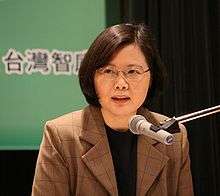
DPP Chair
First term: 2008–2012
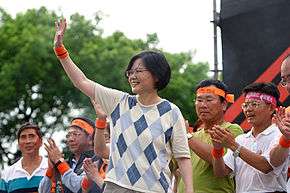
Tsai took office on 20 May 2008, the same day Ma Ying-jeou was inaugurated as president. She said that DPP would work to deepen the Taiwanese localization movement while defending social justice. She criticized Ma for mentioning closer Cross-Strait relations but nothing about Taiwan's sovereignty and national security.[22]
Tsai questioned Ma's stand on Taiwan's sovereign status. Ma emphasized the importance of the so-called 1992 Consensus and called Tsai a Taiwan independence extremist. Tsai criticized Ma's government for not answering her question and labeling others.[23]
After former President Chen Shui-bian's acknowledgment of transferring past campaign funds overseas, Tsai apologized to the public and also said that the DPP would not try to cover up for Chen's alleged misdeeds.[24] The Clean Government Commission was set up to investigate corruption within the DPP.[25]
On 25 April 2010, Tsai participated in a televised debate against President and Kuomintang chairman Ma Ying-jeou over a proposed trade deal with China. While President Ma believed that the agreement with mainland China, called the Economic Cooperation Framework Agreement (ECFA), would increase Taiwanese exports to China and lower unemployment rates, Tsai said it "will force Taiwan to open up for cheap Chinese exports eventually" and certain domestic industries will be harmed by the mainland trade invasion. Tsai also said that the pact "will make Taiwan lose its independence in cross-strait relations and become a Chinese parasite" and that Taiwan should negotiate with China under the multilateral-framework World Trade Organization, which would offer more trade protections and emphasize Taiwan's distinct status.[26]
Under Tsai's leadership, along with some of KMT's unpopular policies, the DPP has been regaining momentum in elections since 2009, after the major defeats from 2006 to 2008.[27] In 2010, she was re-elected as the chair of the DPP.
Tsai made a controversial statement in May 2010 claiming that the Republic of China was a "government-in-exile" non-native to Taiwan;[28] however on 8 October 2011, two days prior to the 100-year anniversary celebrations of the Double Ten Day, Tsai changed her statement, stating that "The ROC is Taiwan, Taiwan is the ROC, and the current ROC government is no longer ruled by a non-native political power".[28][29]
Tsai resigned as chair of the DPP after losing her 2012 presidential election bid to incumbent Ma Ying-jeou.[30]
Second term: 2014–present
On 15 March 2014, Tsai announced that she would once more run for party chief of the DPP against incumbent Su Tseng-chang and Frank Hsieh.[31] However, both Su and Hsieh dropped out of the election in the aftermath of the Sunflower Student Movement. Tsai defeated Kaohsiung County deputy commissioner Kuo Tai-lin by 79,676 votes.[32][33]
Tsai led the DPP to a historic victory in the local elections held on 29 November 2014, in which the party secured leadership of 13 of Taiwan's 22 municipalities and counties. The DPP's stunning victory in the elections strengthened Tsai's position within the party and placed her as the front-runner in the 2016 Presidential Elections; she announced her second bid for the Presidency on 15 February 2015.[34] On 16 January 2016, she won the election by a landslide, winning 56.12% of votes, beating her opponent Eric Chu, who won 31.07% of the votes.[35]
Presidential campaigns
2012
On 11 March 2011, Tsai Ing-wen officially announced her run for the presidential nomination of the Democratic Progressive Party.[36] On 27 April 2011, Tsai became the first female presidential candidate in Taiwan after she defeated former Premier Su Tseng-chang by a small margin in a nationwide phone poll (of more than 15,000 samples) that served as the party's primary.[37] Tsai ran against incumbent President Ma Ying-jeou of the Kuomintang and James Soong of the People First Party in the 5th direct presidential election, which was held on 14 January 2012.[38] Garnering 45% of the vote, she conceded defeat to President Ma in an international press conference, resigning her seat as Chairman of the DPP.[39]
| Party | Candidate | Votes | Percentage | |||
|---|---|---|---|---|---|---|
| President | Vice president | |||||
| Ma Ying-jeou | Wu Den-yih | 6,891,139 | 51.60% | |||
| Tsai Ing-wen | Su Chia-chyuan | 6,093,578 | 45.63% | |||
| James Soong | Lin Ruey-shiung | 369,588 | 2.77% | |||
| Total | 13,354,305 | 100% | ||||
2016
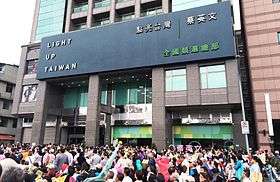
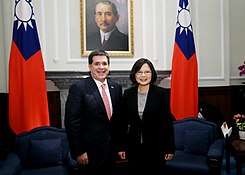
On 15 February 2015, Tsai officially registered for the Democratic Progressive Party's presidential nomination primary.[40] Though William Lai and Su Tseng-chang were seen as likely opponents,[41] Tsai was the only candidate to run in the primary and the DPP officially nominated her as the presidential candidate on 15 April.[42][43] She was the first-ever female candidate for President of Taiwan.
During summer of 2015, Tsai embarked on a visit to the United States and met a number of US policy makers including Senators John McCain and Jack Reed.[44] In her speech addressing Taiwanese diaspora on the east coast of the United States, Tsai signaled a willingness to cooperate with the rising Third Party coalition in Taiwan in the incoming general election.[45] On November 14, Tsai's campaign announced that she had chosen Chen Chien-jen as DPP vice presidential candidate.[46] On 16 January 2016, Tsai won the presidential election, beating her opponent Eric Chu by a margin of 25.04%.[35] Tsai was inaugurated as president on 20 May 2016.
After her election, Tsai was named "The 100 Most Influential People" in TIME magazine 2 May 2016 issue.[47]
| Party | Candidate | Votes | Percentage | |||
|---|---|---|---|---|---|---|
| President | Vice president | |||||
| Tsai Ing-wen | Chen Chien-jen | 6,894,744 | 56.12% | |||
| Eric Chu | Wang Ju-hsuan | 3,813,365 | 31.04% | |||
| James Soong | Hsu Hsin-ying | 1,576,861 | 12.84% | |||
| Total | 12,284,970 | 100% | ||||
Political positions and Presidency
United States
.jpg)
Tsai supports strong and stable relationships between Taiwan (ROC) and the United States. In early December 2016, Tsai held an unprecedented telephone call with President-elect Donald Trump. This was the first time that the President of ROC spoke with the president or president-elect of the United States since 1979. Afterwards, she indicated there had been no major "policy shift".[48]
Cross-strait relations
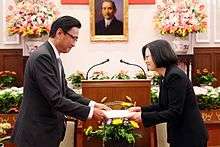
The DPP's traditional position on the issue of cross-strait relations is that the Republic of China, widely known as Taiwan, is already an independent state governing the territories of Kinmen, Matsu, Penghu Islands, and the island of Taiwan, thus rendering a formal declaration of independence unnecessary. While Tsai has never departed fundamentally from the party line, her personal approach to the issue is nuanced and evolving.
During the 2012 presidential election cycle, Tsai said that she disagreed with the 1992 Consensus as the basis for negotiations between Taiwan and mainland China, that such a consensus only served to buttress the "One China Principle", and that "no such consensus exists" because the majority of the Taiwanese public does not necessarily agree with this consensus. She believed that broad consultations should be held at all levels of Taiwanese society to decide the basis on which to advance negotiations with Beijing, dubbed the "Taiwan consensus". During the 2016 election cycle, Tsai was notably more moderate, making "maintaining the status quo" the centerpiece of party policy. She vowed to work within the Republic of China governing framework in addition to preserving the progress made in cross-strait relations by previous governments, while preserving "freedom and democracy" for the residents of Taiwan.[49]
Tsai believes in the importance of economic and trade links with mainland China, but publicly spoke out against the Economic Cooperation Framework Agreement (ECFA), a preferential trade agreement that increased economic links between Taiwan and mainland China. She generally supports the diversification of Taiwan's economic partners.
In response to the death of Chinese Nobel Peace Prize laureate Liu Xiaobo, who died of organ failure while in government custody, Tsai pleaded with the Communist government to "show confidence in engaging in political reform so that the Chinese can enjoy the God-given rights of freedom and democracy."[50]
Domestic policy
Tsai has traditionally been supportive of disadvantaged groups in society, including the poor, women and children, Taiwanese aborigines, and LGBT groups. She favours government action to reduce unemployment, introducing incentives for entrepreneurship among youth, expanding public housing, and government-mandated childcare support. She supports government transparency and more prudent and disciplined fiscal management.
.jpg)
.jpg)
Tsai advocated for the non-partisanship of the president of the Legislative Yuan, the increase in the number of "at-large" seats in the legislature, the broadening of participation among all political parties and interest groups. She supports proactively repairing the damage done to Taiwanese aboriginal groups, as well as the government actions in the February 28 Incident and during the phase of White Terror. She has also called for the de-polarization of Taiwanese politics, and advocates for a more open and consensus-based approach to addressing issues and passing legislation.[51]
Stance on LGBT issues
Tsai supports LGBT rights and endorsed same-sex marriage to be legalised in Taiwan. On 21 August 2015, which is the Qixi Festival, she released a campaign video in which three same-sex couples actors appeared.[52][53] On 31 October 2015, when the biggest gay pride parade in Asia was held in Taipei, Tsai expressed her support for same-sex marriage.[54] She posted a 15-second video on her Facebook page saying "I am Tsai Ing-wen, and I support marriage equality" and "Let everyone be able to freely love and pursue happiness".[55][56]
Family and personal life
Tsai's paternal grandfather, of Hakka descent, came from a prominent family in Fangshan, Pingtung, while her grandmother, from Shizi, Pingtung, was of aboriginal Paiwan descent.[57][58] Tsai's father, Tsai Chieh-sheng (蔡潔生; Cài Jiéshēng) owned a car repair business.[59] Tsai's mother is Chang Chin-fong (張金鳳; Zhāng Jīnfèng), the last of her father's four mistresses. She is the youngest of her father's 11 children, having 3 full siblings among them; she also has a maternal half-brother.[60] Tsai is unmarried and has no children. Tsai is known to be a cat lover, and her two cats, "Think Think" and "Ah Tsai", featured prominently in her election campaign.[61] In October 2016, she adopted three retired guide dogs, named Bella, Bunny and Maru.[62]
According to the traditional Chinese naming practice, Tsai's name would have been 蔡瀛文, since her generation name is 瀛 (yíng), not 英 (yīng).[63] However, her father believed the former to have too many strokes for the girl to learn, so she was instead named 英文, which can be literally translated by its individual parts as "heroic" and "literature; culture", or the Chinese word for the English language if taken even more literally.[63]
Further reading
- Yang, Wan-Ying; Lee, Kuan-Chen (July 2016). "Ready for a Female President in Taiwan?". Journal of Women, Politics & Policy. Taylor and Francis. 37 (4): 464–489. doi:10.1080/1554477X.2016.1192433.
References
- ↑ Ministry of Foreign Affairs brochures MOFA-EN-FO-105-011-I-1 (also appearing in Taiwan Review, May/June 2016) and −004-I-1.
- ↑ "Must-know facts about Taiwan's presidential candidates". Asia Times. 17 December 2015. Retrieved 21 January 2016.
- 1 2 "About Democratic Progressive Party presidential candidate Tsai Ing-wen". Taiwan News. 23 September 2015. Retrieved 21 January 2016.
- ↑ Yeh, Sophia; Chang, S.C. (14 March 2016). "Tsai Ing-wen's brothers vow they will avoid conflicts of interests". Central News Agency. Retrieved 14 March 2016.
- ↑ Vanderklippe, Nathan (15 January 2016). "Tsai Ing-wen: Taiwan's quiet revolutionary". The Globe and Mail. Retrieved 21 January 2016.
- ↑ Li, Xueying (16 January 2015). "Democratic Progressive Party's Tsai Ing-wen becomes Taiwan's first woman president". Straits Times. Retrieved 21 January 2016.
- ↑ "President Tsai".
- ↑ Tom Phillips. "Taiwan elections: the British educated scholar soon to be the most powerful woman in the Chinese-speaking world". the Guardian.
- ↑ 蔡英文回母校中山女高 勉学妹温柔有企图心 Retrieved 11 September 2016
- ↑ Chen, Hsin-yi (July 2012). "A Woman of Many Parts: Tsai Ing-wen". Taiwan Panorama. Retrieved 21 January 2016.
- ↑ "Profile: Tsai Ing-wen". BBC. 12 January 2012. Retrieved 2 January 2015.
- ↑ "Ing-Wen Tsai: Executive Profile & Biography – BusinessWeek". Bloomberg Business. Retrieved 16 January 2015.
- 1 2 Copper, John F. (2012). The KMT Returns to Power. Lexington Books. p. 188. ISBN 9780739174784.
- ↑ Chuang, Jimmy. "Vice Premier Tsai is nobody's fool". Taipei Times. Retrieved 6 February 2017.
- ↑ "Tsai Criticizes "One Country, Two Areas" Now, But Used To Advocate "One Country, Four Areas"". United Daily News. Kuomintang News Network. 26 March 2012. Retrieved 10 December 2014.
- ↑ Tsai, Ing-wen; Wortzel, Larry (14 January 2002). "A New Era in Cross-Strait Relations? Taiwan and China in the WTO". Heritage Foundation. Retrieved 10 December 2014.
- ↑ "Taiwan's new premier picks tough strategist as deputy in limited Cabinet reshuffle" (Press release). The China Post. 17 May 2007. Retrieved 22 May 2008.
- ↑ "Taiwan DPP presidential candidate Tsai Ing-wen strongly defends integrity in biotech investment case". Taiwan News. 16 December 2011. Retrieved 2 January 2015.
- ↑ Wang, Chris (22 December 2011). "2012 ELECTIONS: Yu Chang papers altered twice: DPP". Taipei Times. Retrieved 2 January 2015.
- ↑ Chang, Rich (15 August 2012). "Tsai cleared of Yu Chang allegations". Taipei Times. Retrieved 2 January 2015.
- ↑ "又傳創意組合 蔡英文會是馬英九副手搭檔?". China Review News. crntt.com. 1 June 2007. Retrieved 4 January 2015.
- ↑ "New DPP chief bothered by what Ma did not say" (Press release). Taipei Times. 22 May 2008. Retrieved 22 May 2008.
- ↑ "Tsai rejects independence criticism" (Press release). Taipei Times. 4 June 2008. Retrieved 3 June 2008.
- ↑ Bruyas, Dimitri (16 August 2008). "Disgraced Chen quits the DPP". China Post. Retrieved 2 January 2015.
- ↑ Young, David (15 October 2008). "Chen Shui-bian checkmates DPP chair". China Post. Retrieved 2 January 2015.
- ↑ "Taiwan president and opposition debate China deal" (Press release). Bloomberg BusinessWeek. 25 April 2010. Retrieved 25 April 2010.
- ↑ "Taiwan: DPP sweeps both seats in legislative by-elections – Taiwan News Online".
- 1 2 10 October 2011, KMT blasts Tsai Ing-wen for flip-flop on R.O.C., Taiwan News
- ↑ 10 October 2011, DPP chair attends flag-raising ceremony in southern Taiwan, Focus Taiwan News
- ↑ "Tsai steps down as DPP chair after election defeat" Focus Taiwan News Channel. Retrieved 2012.01.14
- ↑ "Taiwan's Tsai Ing-wen announces bid for DPP chair". Xinhua News Agency. 15 March 2014. Archived from the original on 7 April 2014. Retrieved 15 March 2014.
- ↑ Wang, Chris (26 May 2014). "Tsai Ing-wen elected as DPP chair". Taipei Times. Retrieved 1 June 2014.
- ↑ Chang, Jung-hsiang; Hsu, Elizabeth (25 May 2014). "Tsai Ing-wen wins DPP chair election (update)". Central News Agency. Retrieved 2 June 2014.
- ↑ Loa, Iok-sin (15 February 2015). "Tsai Ing-wen declares candidacy". Taipei Times. Retrieved 15 February 2015.
- 1 2 "Taiwan gets first female President as DPP sweeps election". Channel NewsAsia. Retrieved 16 January 2016.
- ↑ Chao, Vincent Y. (12 March 2011). "Tsai Ing-wen officially launches presidential bid". Taipei Times. Retrieved 2 January 2015.
- ↑ Sui, Cindy (27 April 2011). "Taiwan's first female presidential candidate picked". BBC. Retrieved 2 January 2015.
- ↑ Mozur, Paul (28 April 2011). "Taiwan Opposition Makes Its Pick". Wall Street Journal. Retrieved 2 January 2015. (Subscription required (help)).
- ↑ Wang, Chris (15 January 2012). "2012 ELECTIONS: Tsai's defeat surprisingly large". Taipei Times. Retrieved 2 January 2015.
- ↑ Loa, Iok-sin (16 February 2015). "Tsai Ing-wen makes bid official". Taipei Times. Retrieved 16 February 2015.
- ↑ Loa, Iok-sin (15 February 2015). "Tsai Ing-wen declares candidacy". Taipei Times. Retrieved 26 May 2016.
- ↑ Lu, Hsin-hui; Kao, Evelyn (14 April 2015). "DPP to nominate chairwoman to run for president in 2016". Central News Agency. Retrieved 15 April 2015.
- ↑ Yeh, Sophia; Wang, Flor (15 April 2015). "Tsai Ing-wen to run for president as DPP's candidate". Central News Agency. Retrieved 15 April 2015.
- ↑ Fuchs, Chris (7 June 2015). "Contributing reporter". Taipei Times. Taipei Times. Retrieved 8 June 2015.
- ↑ Loa, Iok-sin (7 June 2015). "Tsai signals more space for third-party hopefuls". Taipei Times. Taipei Times. Taipei Times. Retrieved 8 June 2015.
- ↑ Chen, Chi-fon; Chen, Chi-chung; Wu, Lilian (14 November 2015). "Academia Sinica VP confirmed as running mate of Tsai Ing-wen". Central News Agency. Retrieved 15 November 2015.
- ↑ Lai, Jimmy (21 April 2016). "Tsai Ing-wen". TIME (2 May 2016 vol 187 No 16&17).
- ↑ Editorial, Reuters. "Taiwan's Tsai: no major policy shifts, despite Trump call – reports". reuters.com.
- ↑ "蔡英文:兩岸基本原則 維持現狀". udn.com.
- ↑ "World leaders call for release of Liu Xiaobo's widow". South China Morning Post.
- ↑ "五大政治改革 – 點亮台灣 LIGHT UP TAIWAN". 點亮台灣 LIGHT UP TAIWAN.
- ↑ "祝全天下所有的情人,七夕情人節快樂! | 點亮台灣 LIGHT UP TAIWAN". 點亮台灣 LIGHT UP TAIWAN. Retrieved 4 November 2015.
- ↑ "WATCH: Taiwanese Presidential Candidate Celebrates Love With Same-Sex Couples | Advocate.com". www.advocate.com. 1 October 2015. Retrieved 4 November 2015.
- ↑ "Taiwan crowds march in Asia's biggest gay pride parade". i24news. Retrieved 4 November 2015.
- ↑ "Nearly 80,000 march in Taiwan Pride parade". Spectrum. Archived from the original on 5 November 2015. Retrieved 4 November 2015.
- ↑ "〔我是蔡英文,我支持婚姻平權〕 – 蔡英文 Tsai Ing-wen | Facebook". www.facebook.com. Retrieved 4 November 2015.
- ↑ 林修卉 (7 August 2011). 蔡英文也有原住民血統 祖母是獅子鄉「排灣族」 (in Chinese). 今日新聞網. Retrieved 27 September 2011.
- ↑ Chen, Jay (16 January 2016). "Resolute Tsai scores historic victory". Central News Agency. Retrieved 21 January 2016.
- ↑ Sui, Cindy (16 January 2016). "Taiwan's first female leader, shy but steely Tsai Ing-wen". BBC. Retrieved 21 January 2016.
- ↑ 解密 富商之女蔡英文. 商業周刊. 25 November 2015.
- ↑ "Cat Woman: Taiwan's first female president huge fan of felines". Retrieved 3 December 2016.
- ↑ "President Tsai adopts three retired guide dogs 蔡英文總統 收養三隻退役導盲犬 – Taipei Times". www.taipeitimes.com.
- 1 2 蔡英文; 劉永毅 (2011). 洋蔥炒蛋到小英便當:蔡英文的人生滋味. Taipei: 圓神出版社. ISBN 9789861333861.
External links
- President Tsai, Office of the President, Taiwan
- Official website

| Political offices | ||
|---|---|---|
| Preceded by Su Chi |
Minister of the Mainland Affairs Council 2000–2004 |
Succeeded by Joseph Wu |
| Preceded by Wu Rong-i |
Vice Premier of the Republic of China 2006–2007 |
Succeeded by Chiou I-jen |
| Preceded by Ma Ying-jeou |
President of the Republic of China 2016–present |
Incumbent |
| Party political offices | ||
| Preceded by Frank Hsieh Acting |
Leader of the Democratic Progressive Party 2008–2011 |
Succeeded by Ker Chien-ming Acting |
| Preceded by Ker Chien-ming Acting |
Leader of the Democratic Progressive Party 2011–2012 |
Succeeded by Chen Chu Acting |
| Preceded by Su Tseng-chang |
Leader of the Democratic Progressive Party 2014–present |
Incumbent |
